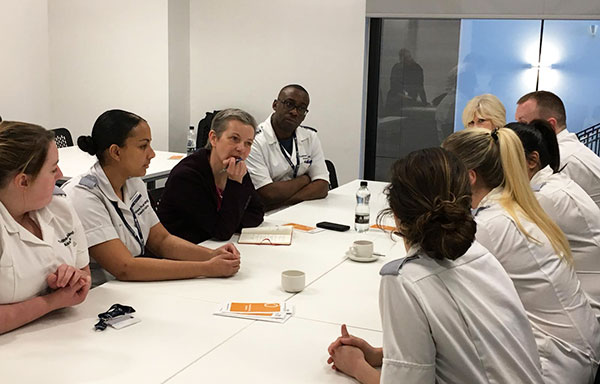Blog: Andrea celebrates the first registered nursing associates
Published on 29 January 2019
In her regular blog, our new Chief Executive, Andrea Sutcliffe, reflects on a landmark moment as the first nursing associates join our register

Yesterday, Monday 28 January, the Nursing and Midwifery Council welcomed the very first nursing associates onto the professional register. As I said in in our press release, this is a landmark moment for health and social care in England and is the result of a tremendous amount of hard work by teams across the NMC; our partners at national and local level in the NHS, social care and education; and the pioneer nursing associates themselves.
The day started early with my colleague, the indefatigable Emma Westcott emailing at 4.42am to say that “the first nursing associates are appearing on the public-facing NMC register.” However much planning, preparation and testing you do – that moment when you find out it has all worked is just wonderful.
What is a nursing associate?
If you haven’t coming across nursing associates yet, they are a new member of the nursing team who will provide care and support for people using health and social care services in England. The role is intended to address the skills gap between health and care assistants and registered nurses. It is a stand-alone role but will also provide a progression route into graduate level nursing. Nursing associates will be trained to work with people of all ages and in a variety of settings in health and social care.
The NMC has set the standards for nursing associates which outline what a nursing associate should know and be able to do when they join our register. We have also set the standards for nursing associate education programmes that lead to registration and we will be approving many of these this year.
Welcome
The welcome for nursing associates joining the register yesterday came from all directions:
The Minister of State for Health, Stephen Hammond: “Delighted that nursing associates can register with the NMC from today.”
The Chief Nursing Officer for England, Ruth May: “Welcome to the first nursing associates joining our workforce from today. They will play an essential role.”
Our national partners who have played such an important role in introducing nursing associates, were also very positive. For example, in her blog the Chief Nurse for Health Education England, Professor Lisa Bayliss Pratt said:
“Our new nursing associates will be a vital part of the wider health and care team, providing valuable support to registered nurses and enabling them to focus on more complex clinical duties.”
And my former colleagues at the Care Quality Commission have provided a really useful briefing that explains how they will monitor providers to ensure that using nursing associates is safe and supports the delivery of high-quality care.
Pioneers
But what about the nursing associates themselves? I had the opportunity to meet a group of trainee nursing associates in Birmingham last week – they were very impressive and showed what a positive contribution this new profession will make for people using health and care services. Sean, Phil, Sam, Kelly, Holly, Amy, another Amy and Michelle explained how much they had enjoyed their training, combining hands-on practical skills development with their learning. They appreciated the opportunity to work in different settings through the varied placements and they also described how they had taken aspects of their new knowledge and understanding back into their workplace. Some saw being a nursing associate as opening new doors for them and a stepping stone to a career in nursing; others were really happy with the role and wanted to concentrate on that.
You can also hear from three nursing associates who were interviewed alongside Julie Goldie, Head of Professional Support and Development at St Georges Hospital in Tooting and Emma Westcott on You and Yours yesterday (starting at 23.35).

Making a difference
While yesterday was a very important milestone for the introduction of nursing associates, what really matters is whether they can make a difference for people using health and care services. From my meeting last week and the comments of trainees on Twitter in recent weeks, I know they have the enthusiasm, the commitment and dedication to provide great care.
As their professional regulator, the NMC has an important role in setting the standards for their practice and education, admitting them to the register, supporting their revalidation every three years and investigating if concerns are raised. But we cannot be there all the time, and employers in health and social care will play a vital role. I was delighted to see the positive comments from NHS and social care managers welcoming and supporting their new colleagues yesterday:
George Coxon, Pottles Court in Devon: “So pleased to be a part of this…the first group were terrific – added so much, challenged us, shared, joined in and I know I learnt lots too.”
Kathryn Halford, Chief Nurse, BHRUT: “I’m so proud that after two years we will be celebrating the completion of this course with so many of our trainee nursing associates.”
The signs are looking good for this to be a great success.
And in other news…
If you want to know what else I got up to last week, please watch this video!
The end of another busy week for @Crouchendtiger7...learning a lot from colleagues, registrants and our partners just 1️⃣2️⃣ days into the job.
— The NMC (@nmcnews) 25 January 2019
Listen in to what Andrea has been up to ⬇️ #listeningmode pic.twitter.com/BoZ8LrOa9P
Other recent news…
Blog: #FutureCommunityNurse: making the most of this opportunity
Published on 05 July 2021
Our Chief Executive and Registrar, Andrea Sutcliffe, explains why your involvement in our consultation on draft standards for community and public health nursin
Blog: What we’re doing to improve how we regulate, for the benefit of the people we serve
Published on 02 June 2021
In her latest blog, Andrea Sutcliffe, our Chief Executive and Registrar, explains what we’re doing to improve how we regulate, for the benefit of the people we
Blog: Better, safer regulation for the public
Published on 13 May 2021
Our Executive Director of Strategy and Insight, Matthew McClelland, explains why the Government's proposed changes to our legislative framework will allow us to






